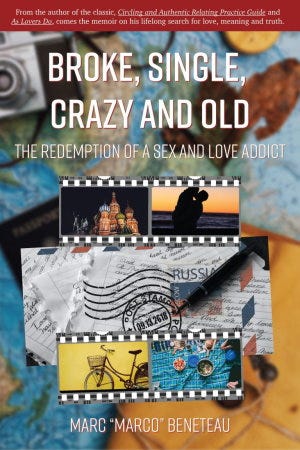Trauma is good for you: Authentic Relating and "karma acceleration"
The second most vulnerable post I have ever written
A follow-up to my previous post: why trauma is good for you
If you are tracking me here, you probably know of my year-long attempt to create Authentic Relating (AR) community in Mexico, which had some spectacular successes and failures both.
This post will be intensely personal at times, but it’s mostly some theoretical background on the problem of being an AR leader, what might happen to you in that attempt, what to expect, ways to mitigate the risk and then rise from the ashes of your own (probably painful) transformation. There is a follow-up to this post (relating to AR-sourced Intentional Community) called The Dream Is Alive, Part 2. These are happening times for us.
Nobody in the global AR community is talking about this, by the way, as far as I know. First, very few of us get the power of the practice when applied to real-world problems, which include intentional communities in all forms; and second we are, for the most part, islands, each of us pursuing our own agendas without much dialogue or collaboration. This needs to change, and I have a number of current initiatives around that.
Authentic Relating is a flaming sword (the sword of human transformation) and will cut both ways. This is the meaning of “karma acceleration”
“Karma acceleration”, as I call it, means the acceleration of personal and global transformation: more good shit happens, but more bad shit happens as well. I also call this “transformation at the speed of light”, or “intense karmic flow”. In the activation of collective intelligence (which is what AR does superlatively well), “karma acceleration” is inevitable.
So here is what might happen. I am not saying it will. But it might:
You will work your ass off, often for free; people will consume your attention, services and offers and get value from them; and then they will give you all kinds of projections, shit on you, blame you for their feelings, give you the finger and leave. They may also just ghost you and you will wonder what happened. All your self-esteem issues will likely arise and all the problems of your characterology will surface for you to examine. Even in a best-case scenario, you can bet your last dollar that they will make you work.
Lucky you. This is not an invitation to self-pity, but for power and transformation.
Here is my bias: Authentic Relating is the single most powerful human transformational modality ever invented
This is spoken like a true Authentic Relating evangelist, or “AR fanatic”, so “take what you like and leave the rest”. But I will say it again: AR is the single most powerful human transformational modality ever invented. It also happens to be open-source, under distributed leadership (which enormously reduces the “cult danger”), relatively low-cost and sometimes free. Nothing like this has ever before been seen in human history.
AR is a kind of “transcend and include” of NVC. As Jason Digges shared with me in this short (11-min) interview, AR draws from many sources including NVC, Gestalt Psychology, Integral Theory, the philosophy of Martin Heidegger, man/woman ideas from David Deida and Lafayette Morehouse, and more. You can read more about the history of AR here. This is the reason that AR is more complex (and hence more powerful) than NVC: it has a wider base. But with more power comes more danger. Of course.
So what happens in the activation of collective intelligence?
My view of AR is that it is an investigation into the fundamental problems of our humanity, and particularly through the structure called the Focus Circle. The focus circle is one of the root practices of AR and perhaps the most important one. It is the basis of the programs I run with Sophie, called Authentic Relating in Community (ARC).
One of my ideas (which I write about in Relational Power), is that all non survival-related human needs derive from two root ones: the need to belong (the need for love and affection and healthy sexual expression), and the need to contribute to other human beings (to make a difference to them, to have creative and impactful self-expression).
The reason that AR is so effective is that we can’t solve either of these problems alone. I mean: obviously, we can’t love and be loved alone. But also, we can’t make meaningful contributions to others without their feedback either. Their feedback is actually the only way (ultimately) that we will know that we are making a difference to them. The world’s greatest novel cannot be that, by definition, if nobody reads it.
This is also called “we discover ourselves through the eyes of others” and is true in both the dimensions of human loving (the need to belong and the need to contribute to others).
Creating “tribes” is work at the leading edge of human culture. If you can do this effectively, you will be happy
And this is the reason is that AR is the single most powerful human transformational modality ever invented: “tribes” is a deep hunger in the world today. It may indeed be the solution to the world’s problems. If it’s not too late.
Of course, creating tribes is complex and involves many practices and dimensions of being. But if I were to pick only one such practice, I would pick AR.
I also call this “communities of fun, love and transformation”. It’s what I am seeking, my “invented family”, my “band of brothers and sisters”, “the meeting of hearts and minds”. It is a dream which I have carried in my heart ever since I can remember and which I have been pursuing for 40 years. George Bernard Shaw calls this “this is the true joy in life, being used for a purpose recognized by yourself as a mighty one“. Jesus calls this “the meek shall inherit the earth”. I like to think that in this statement, Jesus was not inviting us all to be door-mats. He was talking about the vulnerable, undefended, heart-open, generous expression of our human needs. He was talking about Authentic Relating, and its precursor which is NVC.
The currency of love, as revealed through AR practices, is at least as powerful as the currency of money. With the additional advantage being, that if you happen to be broke (like me) you can still make waves and live your ideal life.
If you can do this successfully you may experience what Frederic Buechner calls “your deep gladness meeting the world’s deep need”. There is no better life, from my perspective, than being a professional AR facilitator and tribe-builder.
Finally, a few embarrassing reveals…
18 months ago I wrote, in the first draft of the Introduction to Relational Power, that “something has happened to me: I am happy all the time. Within the limits of my characterology, of course”.
“Within the limits of my characterology” is a pretty sweeping caveat, as I am somewhere on the bipolar spectrum (“Mixed episode” is my self-diagnosis, for all it’s worth). So this statement written 18 months ago was partly true, and NOT a completely bipolar utterance. It was not entirely a “bipolar moment”, caused by the publication of my most important book at that time, Relational Power. The completion of a writing project always makes me very-very high, as told in my memoir, Broke, Single, Crazy and Old, a 20-year work whose publication preceded the first draft of Relational Power by a mere 6 months (“transformation at the speed of light”):
What I did not know, however, when I wrote that statement, was that the next 18 months would be the toughest (most traumatic) time of my life). In the last 18 months I have experienced huge challenges: financial, physical and emotional. But I have emerged from the ashes — the ashes of my own trauma, which like all trauma is both personal, ancestral, and collective / karmic — a stronger, wiser, more mature and more capable person.
As is meant to be. Because trauma is good for you.
Where I am at currently (July 2024)
At the time of this writing, I am staying in Austin TX on my way to Philadelphia. My AR career has taken off, I have powerful friendships and business collaborations developing nicely, I have support for this work from the two largest associations of IC’s and eco-villages in the world, the Global Eco-Village Network and Federation of Intentional Communities, and my programs there are selling out. There has been an explosion in my creative writing.
Essentially, I am winning everywhere. The “40-year war against myself and against the world” has, at least for now, been won. Or maybe a truce has been declared.
In conclusion, an important caveat: you have to really care
In my experience, there is nothing more powerful for the amplification of love through collective intelligence, as the skillful practice of AR. But there is one, very important caveat: AR is a tool. But to use that tool effectively, you have to really care.
“Caring” is actually quite complex as everyone wants to be cared for in a different way. Caring is more than the desire to help or be close to someone. It is both intention and action.
Sometimes, I actually don’t care. Or at least I think I don’t. Sometimes I am so fed-up with some of the lunatics which God, in his strange wisdom, has sent my way (there have been quite a few of these people in the last year), that I walk away. I do so at times, I will admit, with a few choice epithets designed to hurt them the most.
On deeper reflection, however, and after time has gone by, I (almost) always realize that my anger towards people who don’t show up for me as I want them to, and who sometimes walk away from me with condescension and contempt (the things that make me most crazy) — that my anger is almost always a response to hurt. A response to my own developmental trauma. And that the anger is really a surfacing of that trauma. And hence is a useful emotion.
Sometimes, I have realized, I need to walk away. How I do it is really the key, however.
I don’t think there is an easy answer to this problem. I am still, to quote Rilke, “feeling into the question”. At the moment I am feeling into the answer that Christianity, other world religions, and developmental modalities such as Somatic Experiencing, provide to this problem. The problem is: what is true “meekness” and how to access that?
PS: Interesting related resources (which I am currently listening to on audiobook): Peter Levine An Autobiography of Trauma and Swami Sivananda Radha Radha: Diary of a Woman's Search. The first relates to trauma, and the second relates to “meekness” and is really very moving for me.
To be continued.



